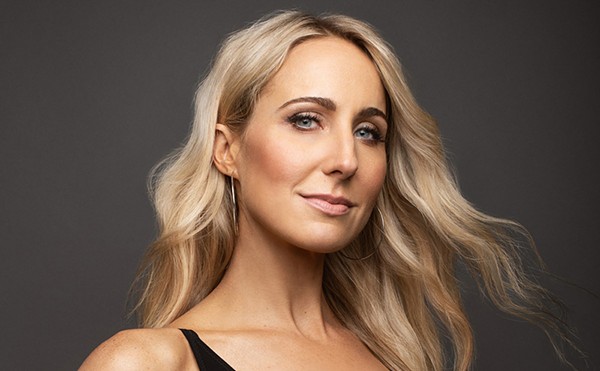Why? Not because there are spoilers ahead that might reveal the plot. Rather, because there has always been a tangible disconnect between Caryl Churchill's innovative play and what gets written about that play. Words are by their very nature limiting, yet Cloud Nine is a play without limits. Chances are, the more you read about it, the more confusing it will sound and the less inclined you'll be to attend the production. That would be a mistake.
In the abstract, the premise is not easily explained. Seven actors double, and occasionally even triple, roles to portray sixteen characters. (OK, that's clear enough.) Act One begins just before Christmas in 1879; Act Two occurs more than a century later. (Yeah, check.) But in Act Two the characters have aged only 25 years. (Come again?) Not much else is as it appears: Male actors perform female roles; women play boys; a white actor portrays a character of color. And by evening's end, everybody's sleeping around with everybody, including brothers and sisters.
Although there's no rational rhyme or reason to any of it, Cloud Nine plays out with the simplicity of a child performing piano scales. In the interest of clarity, the setting for this particular staging has been adroitly shifted from Africa and London to Arizona and New York City. All those allusions to British colonialism now work equally effectively as barbs about this nation's treatment of Native Americans.
The acting ensemble in this Washington University Performing Arts Department production is just this side of miraculous. There's no need to point out that this is a student cast; so many interchangeable characters assure that someone's going to be miscast anyway. But there is wonderful work here. As an austere nineteenth-century patriarch, Adam Rubin bears an eerily uncanny resemblance to character actor Victor Jory. John Stadler has grand fun flitting through Act One in drag, but then he brings depth and sensitivity to a young gay man in Act Two. Christena Doggrell, who spends Act One as an effete young boy, brings maturity and intelligence to Act Two as an adult woman with ambivalent feelings about her sexuality.
But then, all seven performers -- Louise Edwards, Molly Martin, Lee Osorio and Brian Stojak are equally impressive -- make major contributions to the evening's success. It's as if director Andrea Urice has staged the show with a tuning fork; the entire production is pitch perfect. When you consider that the tone and objective of each act is so distinct (Act One revels in farce, Act Two is realistic and introspective), Urice's achievement is all the more impressive.
A great deal is made in the playbill (as it usually is for productions of Cloud Nine) about Churchill's multilayered cultural and social themes. Otherwise well-intentioned people seem determined to ensure that this two-act conundrum about sexual identity will be difficult to decipher. But just possibly you don't have to look further than the script itself to reach some essential understanding of what Churchill is trying to say. In Act Two a promiscuous gay stud implores, "Just hold me." Isn't that the simple request at the root of this fantasia? Regardless of the century or the continent, people still need to be held.
Perhaps this play isn't as confusing as we originally thought. Or perhaps it is. You can find as much or as little in Cloud Nine as you desire. But one thing is certain: If you'll allow this sparkling production to roll over you, you're likely to have an exhilarating and even a liberating experience.





